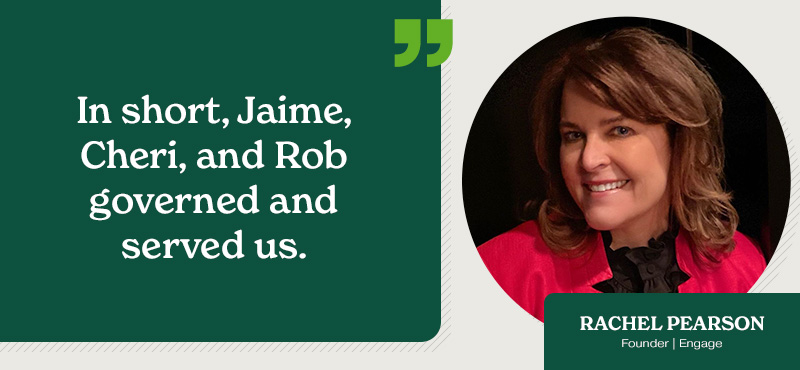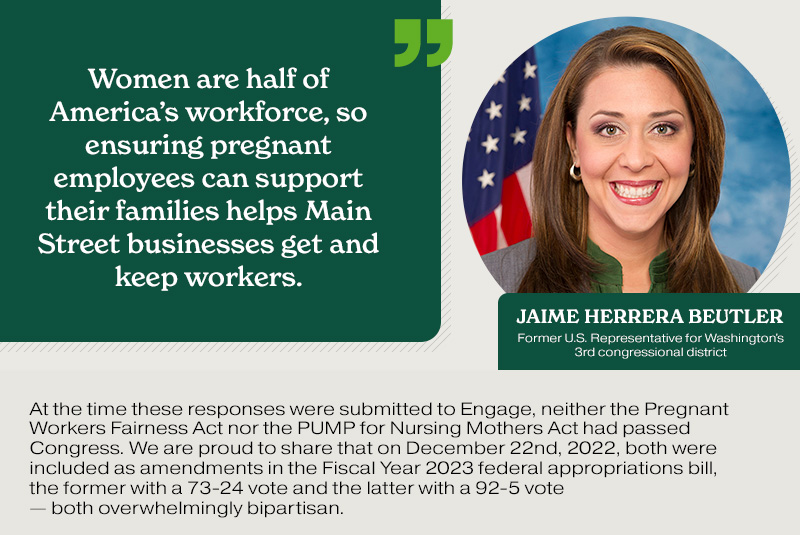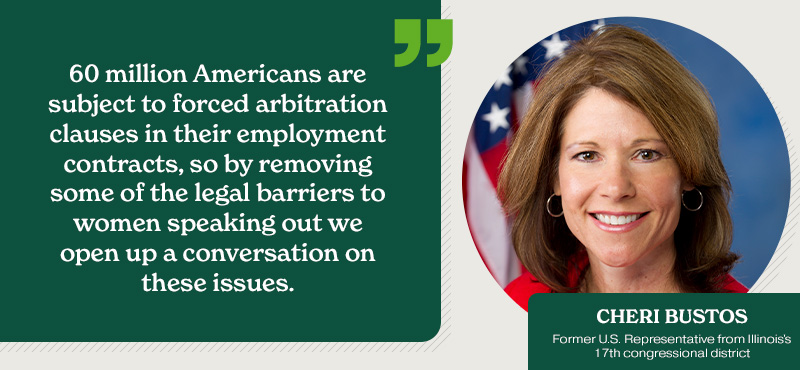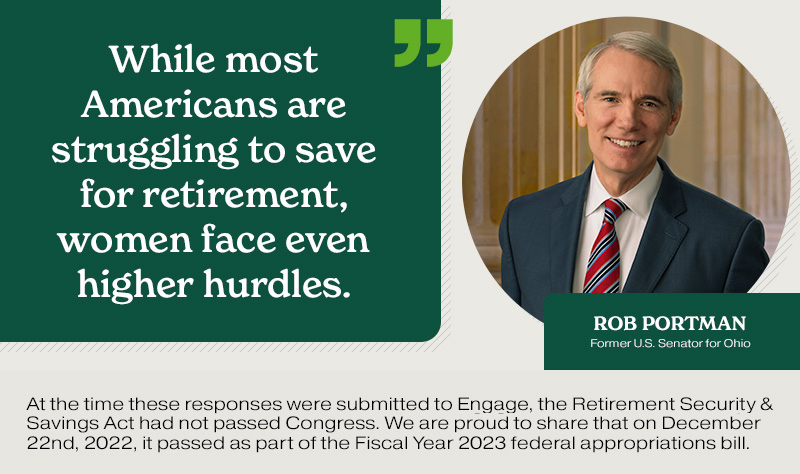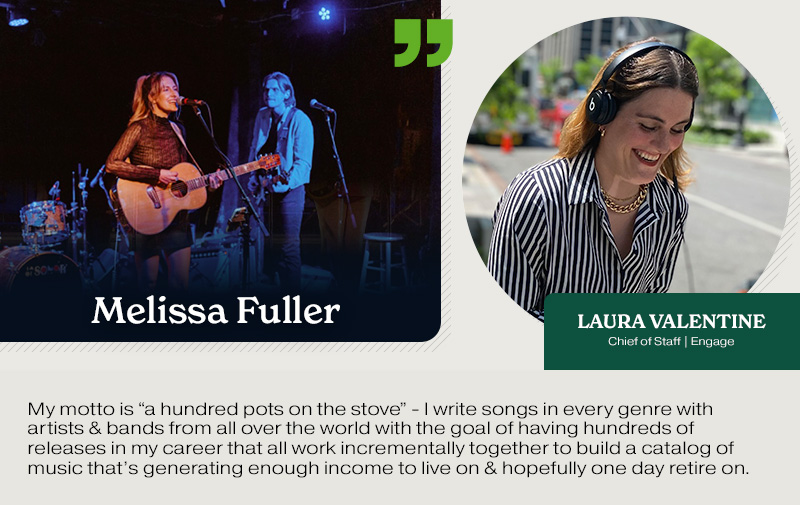Issue spotlight. Women-centered. Reliable facts. Edition 8

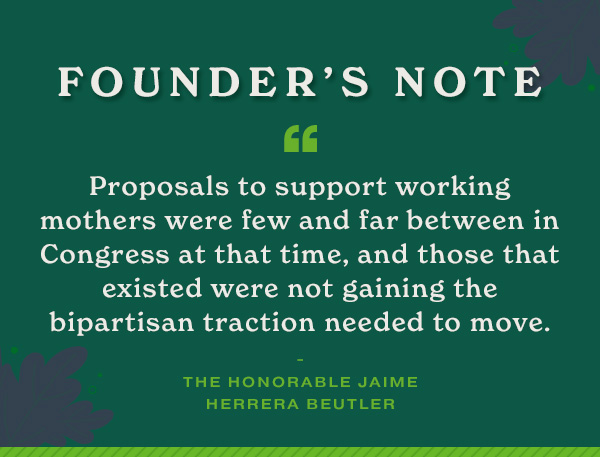

Happy New Year from Engage HQ,
2023 is here, and I, for one, am excited, hopeful, and very aware of the tremendous opportunity that exists for us to make progress on issues of women’s economic security.
This is the first issue of The Thread in a bit, and I believe it reflects so well one of the directives I have heard repeatedly from Engage friends across the country: the desire to hear about bipartisan work and positive legislation that improves the lives of all Americans.
Our issue highlights the accomplishments of three Members of Congress who moved on at the end of 2022, two due to retirement and one because of defeat. The very Honorable Cheri Bustos, Rob Portman, and Jaime Herrera Beutler all left their mark on our nation’s legislative body in profound ways. How do I define that? By their legislative record, the respect they garnered on both sides of the aisle, and how blooming hard they worked on behalf of their constituents. In short, Jaime, Cheri, and Rob governed and served us.
Their interviews below reflect on this service. They drafted laws we needed. Laws that improve the chances women have to secure their economic futures. They also left behind legislation they were not able to finish before their departures. Hopefully, you feel as triggered by that as Engage does. Those issues are on our agenda for 2023.
Last year was a remarkable year of planning for Engage. A three-year strategic plan was drafted, graciously underwritten by one of our sponsors. It was at times a hard, grueling process, but it was also very clarifying. My profound thanks to Nancy Hammer and Laura Valentine who went through it all with me. The final draft, over sixty pages, is marked with your patience, care, and prose.
Last week, I spoke with Spotlight about the role of Engage — where we’ve been and where we’re headed. As I mentioned in the article, I believe that there are millions of Americans and certainly millions of women that just want to see some progress in the years to come.
We start the year with our first Executive Director, Toby Tyler Douthat. Much more about her to come in a future issue. I will say, she attended the very first summit in November of 2018, and her radiance and passion for our mission was clear immediately.
Laura Valentine’s Lyrics with Laura feature is back. She interviews Melissa Fuller, a major singer songwriter talent who I adore.
Finally, mark your calendars in ink right now for our State of the Majority Summit, which will take place in Washington, DC on March 29th. Women outnumber, outvote and outlive men.™ Please help us make it the “must attend” convening of the year.
The lyrics below are from a song of Melissa’s titled Some Things Never Change. I recommend you queue it up immediately.
Some things never change, crying in the sheets
Some things never change, it isn’t what it seems
Some things never change, love is all you need
Let’s Engage together,
Rachel
Rachel Pearson is the Founder of Engage. You can reach her at rachel@engagewomen.org.

For sponsorship opportunities or attendance details,
please contact laura@engagewomen.org.
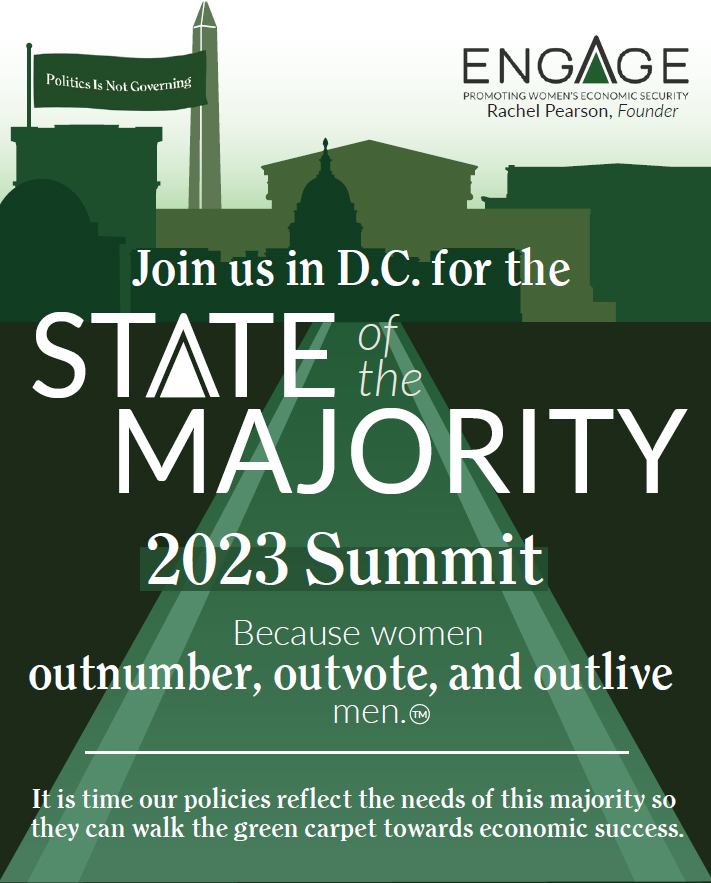

What piece of bipartisan legislation did you sponsor or cosponsor that is a particular point of pride?
Every parent will tell you that life changes after having kids. The same was true for me after I had my first of three, Abigail, in 2013. Suddenly, I was needing places to pump between votes on the House floor. I was traveling through airport security between Washington, DC and Washington state with milk in bags much bigger than the miniscule amount allowed by TSA. I was discovering firsthand all the hurdles that can sideline so many working moms.
This experience led me to launch the first-ever bipartisan Maternity Care Caucus in Congress along with my Democrat colleague, Lucille Roybal-Allard. Our goal was to move real solutions to help moms and babies thrive.
Proposals to support working mothers were few and far between in Congress at that time, and those that existed were not gaining the bipartisan traction needed to move. We wanted to do better, so we pursued solutions that were going to move the needle for working mothers and moms-to-be, and were not only acceptable but beneficial to the businesses employing them. And they were able to gain broad support among Republicans and Democrats.
Two of these solutions are H.R. 1065, the Pregnant Workers Fairness Act and H.R. 3110, the Providing Urgent Maternal Protections (PUMP) for Nursing Mothers Act.
Who cosponsored the bill, what is it designed to do, and how does it advance women’s economic security?
Both bills were approved by the House in 2021 and are awaiting Senate action. Congressman Jerrold Nadler is the Democrat lead of the Pregnant Workers Fairness Act and Congresswoman Carolyn Maloney is my Democrat partner leading the PUMP for Nursing Mothers Act. Both bills have widespread bipartisan support.
While pregnancy and motherhood are balancing acts, they should not force a woman to choose between keeping a job she wants or risking a healthy pregnancy. I championed the Pregnant Workers Fairness Act because it’s a commonsense solution to ensure pregnant workers are provided with reasonable accommodations like a stool to sit on, a bottle of water, or an extra bathroom break at their place of employment. That’s good for businesses, too, which is especially important in this difficult labor market. Women are half of America’s workforce, so ensuring pregnant employees can support their families helps Main Street businesses get and keep workers.
The PUMP for Nursing Mothers Act is another bill that supports moms and is also good for businesses. This bill simply ensures that working moms are given time to pump during their workday, which gives them the ability to remain in their jobs while also meeting the nutritional needs of their young infants and toddlers.
Is there an unfinished bill or issue that you hope will be taken up by the next Congress?
I’m crossing my fingers that both the Pregnant Workers Fairness Act and the PUMP for Nursing Mothers Act get across the finish line before the end of 2022. If they don’t, I’m hopeful they’ll finally become law next Congress.
And I hope Congress can increase child care options for families across America. My home in Southwest Washington is a “childcare desert,” as are many regions throughout the country. I’m proud to have secured funding to expand child care facilities and help in certain communities in Southwest Washington, but we have much more to do. Without affordable and accessible child care options, it’s impossible for many women to enter or return to the workforce. I’ll continue supporting Congress however I can in this quest.
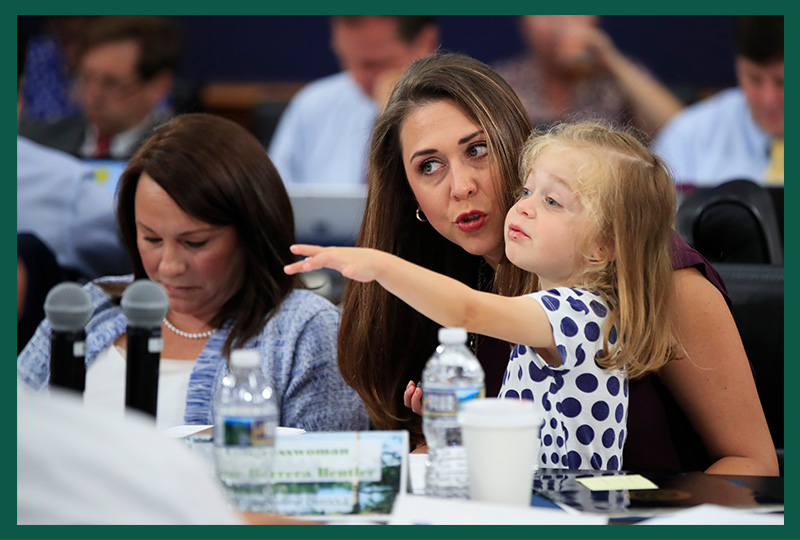

What piece of bipartisan legislation did you sponsor or cosponsor that is a particular point of pride?
I’m very proud of my work to restore the rights of sexual assault and harassment survivors to seek justice in court. In 2017, I wrote and introduced the Ending Forced Arbitration of Sexual Assault and Sexual Harassment Act, which was signed into law by President Biden earlier this year. The idea for this legislation came to me after reading a story in The Washington Post that detailed allegations of sexual abuse at Jared and Kay Jewelers. I was horrified reading these disturbing stories and went to work to solve the issue at its core.
This type of sexual perverseness in the workplace went on for years, and it all stayed secret because of one single legal clause hidden in these women’s employment paperwork. The clause says if a claim arises between an employer and employee, it must go to arbitration – taking the case to court is prohibited.
But these stories weren’t unique to Jared and Kay Jewelers; millions of Americans work under these forced arbitration clauses through their employers and millions more have signed away their rights through property leases, rideshare apps, nursing homes, moving companies, and more.
While some companies have already eliminated this abusive practice, I knew it was time to erase these legal traps for good. That’s why this Congress, I was proud to lead a bipartisan group of Senators and House Members to reintroduce and pass the Ending Forced Arbitration of Sexual Assault and Harassment Act.
Who cosponsored the bill, what is it designed to do, and how does it advance women’s economic security?
I’m proud to carry the torch for the bipartisan Ending Forced Arbitration of Sexual Assault and Sexual Harassment Act, but I couldn’t have gotten it across the finish line without support from Senators Kirsten Gillibrand, Lindsey Graham and Dick Durbin and Reps. Morgan Griffith, Pramila Jayapal, David Cicilline, Jerry Nadler and Ken Buck and fearless champions like Gretchen Carlson, formerly of Fox News.
Not only does this law void forced arbitration clauses in cases involving sexual assault or harassment, but it has helped create a healthier work environment where women now have the right to speak out and pursue justice. It’s estimated that 60 million Americans are subject to forced arbitration clauses in their employment contracts, so by removing some of the legal barriers to women speaking out we open up a conversation on these issues and help expose corrupt behavior to improve toxic working conditions for women.
Recently, we’ve taken another big step toward the next #MeToo milestone. On November 16, 2022, my colleagues, Congresswoman Lois Frankel and Congressman Ken Buck, passed their Speak Out Act out of the U.S. House of Representatives. The bill had already been passed by the Senate and will now head to President Biden’s desk. Like my bill focused on forced arbitration, the Speak Out Act would provide survivors the freedom to decide which option is best for them when it comes to nondisclosure agreements (NDAs) for claims of sexual assault and harassment. Any NDA signed prior to a claim being brought would be voided, allowing survivors to choose to share their stories, go to court, or pursue other legal options.
Is there an unfinished bill or issue that you hope will be taken up by the next Congress?
I’m proud of the work I’ve accomplished since first being elected to Congress, but there will always be areas to improve. In the coming years, I hope to see forced arbitration whittled down until it no longer presents a barrier to any person seeking justice. Forced arbitration exists in hundreds of millions of contracts and can stop many different types of claims, including discrimination based on race, gender or age, and even block claims of physical violence being taken to court.
Among many organizations, the American Association of Justice has been instrumental in the fight against forced arbitration by breaking it down one issue at a time. To address each issue simultaneously, Congress must pass the FAIR Act of 2022. This bill, led by Rep. Hank Johnson, would eliminate forced arbitration clauses in all circumstances.
I’m also optimistic about legislation on rural broadband and the need to further invest in broadband infrastructure in small towns across the United States. This issue is critical for students and women who are primary caregivers so they don’t have to commute to a nearby McDonald’s parking lot or visit a public library to access the internet and work on homework or schedule appointments.
Additionally, as a member of the House Agriculture Committee, I’m eager to see the outcome of the 2023 Farm Bill. In preparation, I helped facilitate listening sessions across the country and worked with my colleagues across the aisle to incorporate the concerns of our family farmers. This bill comes up every five years and addresses the needs of growers and producers as well as the rapidly changing agricultural landscape. The bill will also reauthorize SNAP funding so low-income mothers nationwide can ensure their children have the necessary nutrients and resources to grow and succeed.
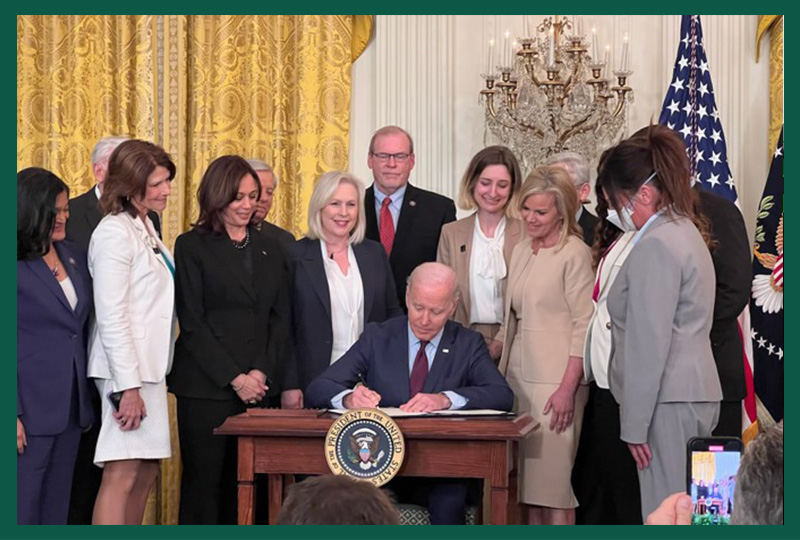

What piece of bipartisan legislation did you sponsor or cosponsor that is a particular point of pride?
I’m proud to have partnered with and worked on a number of important legislative projects during my time in the House and Senate, whether it be the economy and job training, combating addiction, helping sex trafficking survivors, strengthening our cybersecurity laws, or standing with the people of Ukraine, to name a few. But one of the issues I’ve worked on the longest is retirement security, and it stems from the fact that I grew up in a small family business.
My dad started his own business. My mom was the bookkeeper and she said, “We’re going to set up a retirement plan.” It was called a profit sharing plan at the time before 401(k)s existed. They had no profit the first few years, but when they finally started making money, everybody had a stake. When they began, my parents immediately started a 401(k) plan as well. I still meet people today who I have known my entire life who were mechanics who have accumulated a significant retirement savings nest egg because of it.
That inspired me to do more on this issue, and this Congress I’m working to enact the Retirement Security & Savings Act, which will help more Americans save for their retirement.
Who cosponsored the bill, what is it designed to do, and how does it advance women’s economic security?
Senator Ben Cardin (D-MD), my longtime friend and partner on retirement security issues, joined me again in introducing this legislation. We’ve worked closely together previously three separate times to enact retirement security reforms but there is still work to do, which is why we are pushing this legislation. The overall purpose of our bill is to help Americans who have saved too little for their retirement and give more Americans access to retirement plans through small businesses who currently do not offer them.
We also know that while most Americans are struggling to save for retirement, women face even higher hurdles. According to the National Institute on Retirement Security, older women receive about 80 percent of the retirement income older men receive, a disparity that mirrors the gender pay gap. To help address this, our bill makes it easier for part-time workers (who are disproportionately women) to participate in employee-sponsored retirement accounts. By expanding the Saver’s Credit, we will help more lower-income Americans increase their retirement savings, including millions of women. Lastly, our bill makes it easier for military spouses to invest in their retirement accounts (these are predominantly, though not exclusively, women). I’m proud that The Women’s Institute for Secure Retirement (WISER) has been one of our strongest supporters of this legislation.
Is there an unfinished bill or issue that you hope will be taken up by the next Congress?
I am optimistic that we can finish work on our retirement security legislation this Congress and I’m putting all of my energy into getting it done. One bill that is unlikely to get done is my bipartisan JOBS Act I’ve introduced with Senator Tim Kaine (D-VA) to expand Pell Grant eligibility and thus help more Americans gain access to short-term job training programs. This bill will provide valuable skills training for many in demand jobs today and help us begin to close the jobs gap that we see today.
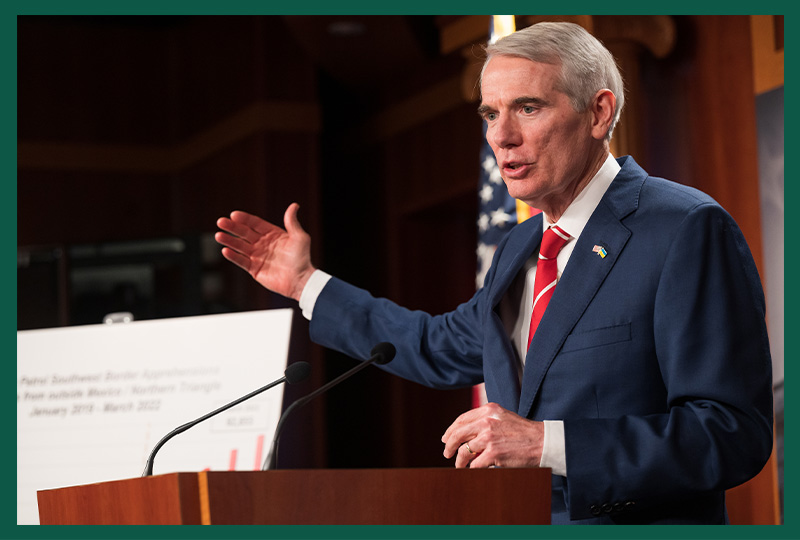

This is a really exciting feature of Lyrics with Laura because it’s my first interview with a real-life artist, Melissa Fuller, songwriter extraordinaire.
I’ve always been fascinated by the reality that lots of artists – Melissa included – write songs for other artists, and it often makes me mad that the writers don’t get more widespread recognition, whether they wrote the lyrics or the music. Below are some examples of famous songs written by women we might not know. Let’s get to know them!
1. “September” – Earth, Wind, & Fire. Written by Allee Willis.
Allee Willis was born and grew up in Detroit, Michigan. She spent her teenage years hanging out outside Motown Records listening to the music coming through the walls. In addition to the work she did with Earth, Wind, & Fire, she also wrote “I’ll Be There For You,” which would become the theme song for Friends.
2. “Love is a Battlefield” – Pat Benatar. Written by Holly Knight.
Allee Willis was born and grew up in Detroit, Michigan. She spent her teenage years hanging out outside Motown Records listening to the music coming through the walls. In addition to the work she did with Earth, Wind, & Fire, she also wrote “I’ll Be There For You,” which would become the theme song for Friends.
3. “Jesus Take the Wheel” – Carrie Underwood. Written by Hillary Lindsey.
Growing up in Washington, Georgia, Hillary Lindsey started writing songs at the age of two. She sang in her church choir and won her first award in the local Kiwanis Talent Showcase when she was eight years old. In 2020, the Academy of Country Music named Lindsey Songwriter of the Year, making her only the second woman in history to receive that honor. Melissa also flagged that she was just inducted into the Nashville Songwriters Hall of Fame last weekend!
4. “Because You Loved Me” – Celine Dion. Written by Diane Eve Warren.
Diane Warren began seriously writing music at age 14. Her mother preferred she give it up and take a secretarial job, but her father continued to encourage her as a songwriter. He bought her a 12-string guitar, a metal shed for her to practice, and took her to music auditions. This song was a tribute to her father for his encouragement.
Now let’s move on to our very special guest, another insanely talented songwriter!
For the last decade, since moving from Wyoming to Nashville, Melissa Fuller has been writing for & collaborating with amazing artists such as Patrick Droney and Mickey Guyton. On October 20th, however, she made the leap to release her own EP, Whippoorwill, which she wrote with an all-star female cast including Kim Richey, Liz Longley & Leslie Jordan. It’s perfect and wonderful – more on that later.
I met Melissa when Rachel took me to a Patrick Droney concert. Melissa was in the band and her vocals and performance made the show as incredible as it was. Naturally, I slid into her DMs with a request to be a part of this feature. I gave her some background on Engage, noting that we focus on bipartisan solutions to the issues that keep American women up all night, namely caregiving, retirement, health, and others related to their economic security. When she responded, “I’d love to be a part of this. Those are the issues that keep me up at night too,” it was clear she was an even better fit than I thought. I’m honored to present her:
You’ve spent a decade writing for & collaborating with incredible artists. On October 20, you dropped your first EP, Whippoorwill, which is magic. What has been your favorite part of going out on your own, and what inspired you to go in the direction that Whippoorwill takes us?
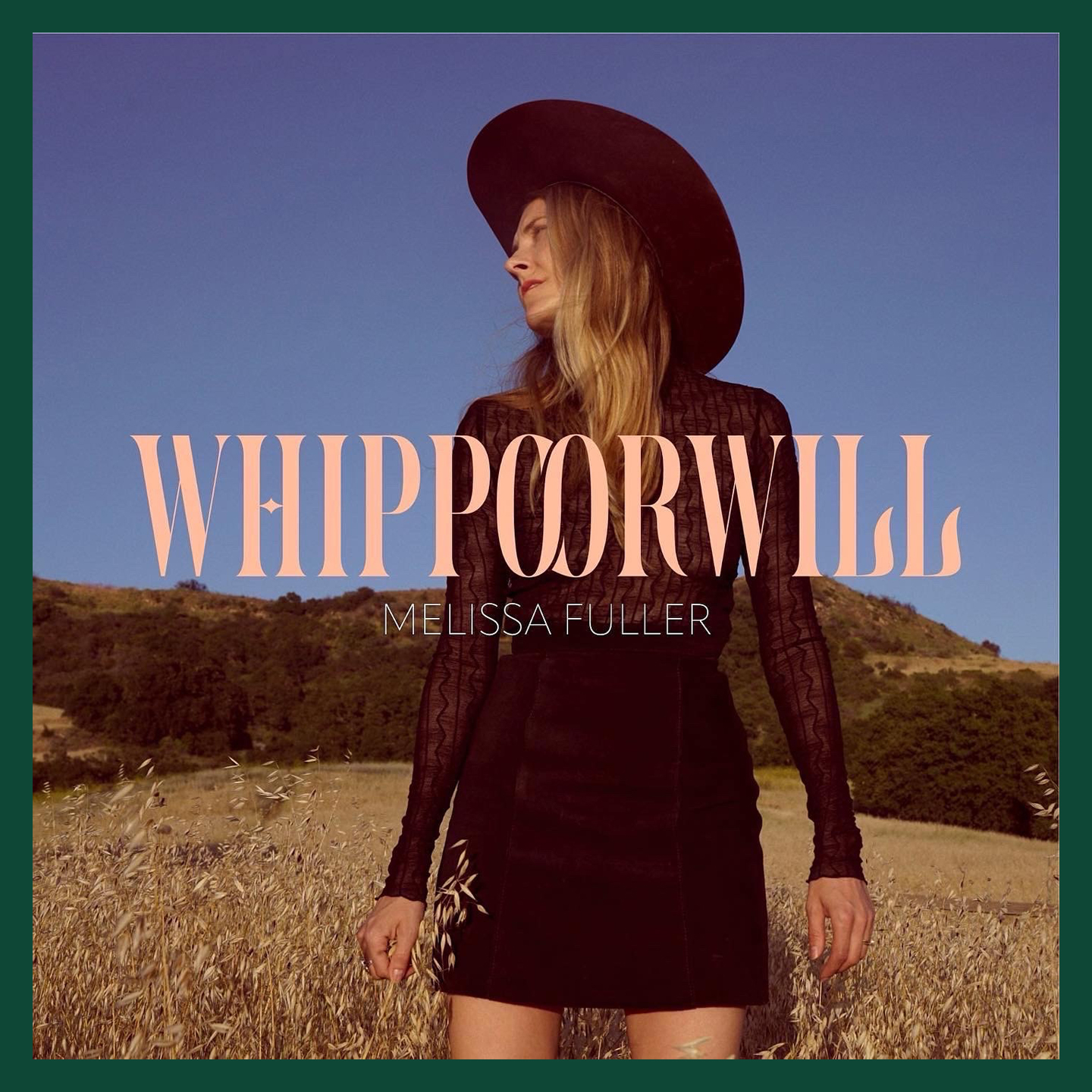
Thank you, releasing music again has been incredibly fulfilling. All of these songs are old friends & melodies that were stuck in my head on sleepless nights. They’re all my stories too & as someone who’s spent the last decade writing for others, I know that’s why they stayed so close after so many years.
When I started recording, my only goal was to make beautiful, polished versions of these songs for myself, my family & friends to have. I love singing harmony & that’s my default when I’m writing or just enjoying music. I layered tracks & tracks of vocals & it was truly magical to build each song with my dear friend & producer Davis Naish. After our first day recording, I knew I had to release what we’d made. The sweetest part of releasing this project has been hearing from women in my industry. So many other writers have sent messages to say I inspired them to put their own music out & artists have told me they’re digging back in their catalogs to give the songs they’ve always loved a life. I didn’t know I’d receive that gift, I honestly didn’t think anyone would listen!
Streaming platforms and other technological advances have reduced barriers to both making and accessing music. Do you think artists are more empowered to create now than they have been in the past? Does this empowerment necessarily mean they have more control over their work product? In other words, are there pros and cons to this?
I recently heard that 100,000 songs are being uploaded to DSPs (streaming platforms like Apple, Spotify, etc.) every single day. The barriers to creating & releasing music are virtually gone, plus anyone around the world with a device can listen for free. Artists are more empowered to create because the definitions of artist & musical genre are wide open. Never in history could you create a song on your computer & upload it to the world!
That being said, the downside of a wide open music industry is that someone has to filter out millions of songs to find what transcends & connects. Just like radio is a very gated access point to a mass audience, so is a playlist from your favorite streaming platform. They’re highly curated but unlike the radio, you can find a playlist for any genre or subgenre of music. That’s a huge upside, but the gatekeepers still exist. Going viral is another way to break through the noise & it has made the discovery of incredible artists possible, artists that might not have broken through otherwise & had no connection to the traditional industry. For any artist that wants to be mainstream, they have to have a significant following on social media to get the attention of the machine that propels their music into the mass marketplace.
In a way, it’s harder than ever for artists. The biggest complaint I hear, almost daily, from artists is that they’re spending more creative energy making social media content to keep fans engaged than they’re making music or playing shows. More often than not, getting booked for great shows or being able to release music on a label or send a song to radio is dependent on social & streaming numbers. It’s becoming less about the album & more about the moment. We’ve hit a weird intersection of fame & talent & they get confused too easily.
The tradition and legacy of female songwriters runs deep. We have those who write the music, those who write the lyrics, and those who perform the song. As you know, sometimes the artist does all three. Who are some of your favorite female lyricists and/or composers? What’s one of your favorite songs written by a woman but “made famous” or performed by someone else?
There’s an incredible woman named Sharon Vaughn & she is my absolute hero. She’s 75 & her first hit was “My Heroes Have Always Been Cowboys” by Merle Haggard. She’s had global hits in pop & country not only as a songwriter but an artist & background singer too. I love writing with her & she has been an incredible mentor to me in the short time I’ve known her.
My list of favorites is long & includes all the legends like Joni, Dolly, Loretta, Carole, Sheryl, Lucinda, I could go on…but my Nashville hometown heroes are Natalie Hemby, Lori McKenna & Sara Buxton. All of these women have strong original voices – I hear them in the songs they write that are often performed by others. They’ve written some of my favorites & have balanced motherhood & career in very inspiring ways.
Now, for some Engage-specific questions:
You mentioned that several of the issues Engage touches keep you up at night as well. What, specifically, worries you as it relates to your economic security or that of your loved ones?
The royalties that a songwriter can earn are set by a rate court & we operate under consent decrees from the early 1900s. Songwriters are not allowed to participate in a free market & tech companies as well as the major record labels have greatly exploited these antiquated laws to their financial benefit. Labels are posting quarterly earnings in the billions because the value of a song is in the master recording (the version you hear) & not the foundation, the melody & lyrics, the song. There are amazing organizations like NSAI & NMPA that work tirelessly to fight for songwriters but the future is dim for someone in my shoes. Songwriters are paid an average of $.003 each time a song is streamed based on the fee set by the governmental rate court, which was just increased after a 4-year legal battle we won against Spotify, Amazon, Pandora & Google.
To add even more perspective, I am usually writing with the artist & producer, those fragments of a penny are then splintered between us. In this scenario, if a song I write is streamed 100 million times, that’s considered a “hit” & I’ll make around $7,000 as the writer of that song. This is not sustainable. A hit songwriter is lucky to have a couple big songs in a year. Up until the streaming model took over, a hit made a songwriter hundreds of thousands of dollars in royalties from the physical sales of vinyl, CDs, radio, etc.
Furthermore, I’m employed by my publisher as a contractor. I don’t get health insurance or have a 401k match or any benefits. At this point in my career, I’m banking on the fact that I have hits in my catalog that haven’t come out or I have yet to write! Songs that will be #1s on radio or transcend the streaming algorithms to garner the hundreds of millions of streams it takes to earn a living wage. This is also one of the reasons I will continue to release my own music – if I own the master recording & it does well, I stand to make 70% more than I would as just the writer.
Then it’s back to the noise of 100,000 songs coming out a day & the acknowledgement that I’ll probably never go viral but I do hope to grow a fanbase of listeners who value the art I’m creating. My motto is “a hundred pots on the stove” – I write songs in every genre with artists & bands from all over the world with the goal of having hundreds of releases in my career that all work incrementally together to build a catalog of music that’s generating enough income to live on & hopefully one day retire on. If you stream music & subscribe to a service monthly, please consider switching to Apple or Tidal. These services pay songwriters a higher rate & were not part of suing to decrease the rate increase we received.
When Mickey Guyton performed at our reception in October 2021, Engage’s message of bipartisanship really resonated with her – she even wore purple to the event! Given that poll after poll shows the vast majority of Americans want our elected leaders to work together, what is your general take on compromise and collaboration in order to get things done?
I love Mickey! She is a dear friend & collaborator & I’m so grateful for her voice in this industry. I’ve realized over the past few years how lucky I am to sit in rooms with people, whose lives & experiences are vastly different than my own, to hear them. To listen so intently that I can then write pieces of stories that are not mine. I find it almost impossible to collaborate if I don’t know “the other.” When you can’t hear a perspective or idea that’s not yours & find a way to make it sing, you’re not collaborating. There’s no compromise. We succeed as a society when we place ourselves in the experience of the other so that we understand their world. We have to be open enough to be known too – that’s how a writer writes from their heart, it’s how any great art is made. I believe collaboration is the only way we can create a better world.
At the end of every Lyrics with Laura feature, I create a playlist of my five favorite songs by the artist I highlight. As fate would have it, Whippoorwill has five songs – those are the ones I’m choosing. But it would be so special if you could also create a five-song, “Lyrics with Melissa” playlist of some of your favorite songs by female artists that our readers
(and I!) can enjoy.
These are the songs that I’ve got on heavy rotation right now… I Still Pray, Mickey Guyton / The Man I’ll Never Find, Lucius / Hospital, Madison Cunningham / Can’t Fight, Lianne La Havas / Time For Everything, Nicole Serrano
You can listen to Melissa’s playlist on Apple Music here.




